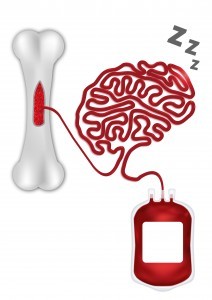Sleep well before Transplant
Sleep deprivation dramatically decreases (50%) the success of bone marrow cell transplantation. This is evident from a study by Assistant Professor Asya Rolls of the Technion, published this month in the journal Nature Communication. Assistant Professor Asya Rolls, faculty member at the Technion’s Rappaport Faculty of Medicine, conducted the study as a postdoc at Stanford University and continued it at her lab at the Technion, together with graduate student Ben Korin.
Tens of thousands of bone marrow transplants, more accurately called hematopoietic stem cell transplants, are performed each year. This is an effective practice to treat certain types of cancer because these are stem cells that can replenish the patient’s blood system and immune system. Stem cells injected into the patient’s blood “migrate” to specialized niches in the patient’s bones and replenish the blood system.
A new study reveals that the “migration skill” of stem cells is dramatically impaired if the donor does not sleep well in the four hours before donating the cells. As a result, the success of the transplant decreases by 50%, as stated.

Sleep affects the migration of stem cells in the context of bone marrow transplants. Figure: Dima Abelsky
“Our study was conducted in mice, and therefore it’s still too early to draw conclusions about humans,” explains Assistant Professor Rolls. “However, the study indicates the importance of sleep in medical procedures. It is clear that in critical and particularly complex procedures such as bone marrow transplants, which require considerable effort in finding a donor and carrying out the treatment, it is important for us to have a very good understanding of the effect of sleep on the success of the medical intervention. If we find that donor sleep deprivation does indeed impair the success of the transplant in humans as well, we will need to think carefully about how to ensure a good sleep – something which is currently difficult to achieve during a hospital stay. There is of course room for optimism, since this is not an insurmountable obstacle; if we allow the donor to sleep before the transplant, we will increase the chances of success. Moreover, our experiment indicated that two hours of “recovery sleep” are sufficient for the donor to restore the relevant capabilities.”
The study, supported by the US National Institutes of Health (NIH), was conducted in collaboration with researchers at Stanford Medical School – Professor Luis de Lecea of the Department of Psychiatry and Professor Irving Weissman, Director of the Institute of Stem Cell Biology and Regenerative Medicine and Prof. H. Craig Heller from the department of Biology at Stanford. Assistant Professor Rolls believes that since stem cells are involved in the regeneration of the blood system and the immune system, there are reasonable grounds to assume that sleep disorders have effects beyond the specific field of bone marrow transplants.



